We made it through semi 1! And is there a better way to promote myself and have my second post out now that we all know how off of the mark I was about semi 1’s results? I think not. So without further ado, my thoughts about semi 2 based only on the brief rehearsal coverage we’ve seen – and by tomorrow night I’ll get to know how far off I was on this one, too.
Malta
Oh my God, you got-got-got me on a loop, Sarah Bonnici sings in this year’s Maltese entry. But if this is the loop we think about when hearing the song’s title, then we’re thinking about the wrong loop. The real loop is actually a vicious repeating cycle that attacks every female Maltese female entrant who comes to Eurovision with at least an adequate song and performing abilities. Now, I’m only guessing here, based on what is a somewhat incomplete dataset, but I have witnessed the Eurovision week rehearsals for both the 2019 and 2021 Maltese entries in full, and there was one very common denominator there.
They both came in with a lovely performer and a fun, well-thought presentation. They both also had a delegation around them that heard technical rehearsals were meant for testing and tweaking the performance and were absolutely unable to set a boundary for when that gets too much. Both performances were tweaked to death, to the point that both Michela and, to a lesser degree (due to experience, more than anything else), Destiny seemed stressed and uncomfortable. And really, how can you be comfortable when your delegation keeps tweaking things on every run-through and essentially lets you know, by doing that each time, that they are unhappy with the product they’ve got?
I can’t tell for certain if what I saw in Sarah’s rehearsal is a result of the idiom “perfect is the enemy of good” apparently not existing in Maltese, but that was the first thing I thought when I watched it. Everything felt stilted and like it’s just trying too hard. It seems like Sarah is very capable of performing it, so I don’t think it’s a result of asking her to do something she’s not comfortable doing. It can also be a result of under-rehearsing, but the choreography was executed well enough for it to feel like the right answer. It can be something small like adjusting camera angles in every run-through, but it ends up meaning the performer needs to keep thinking very hard to remember to look at the right camera. Will you ever break the loop, Malta?
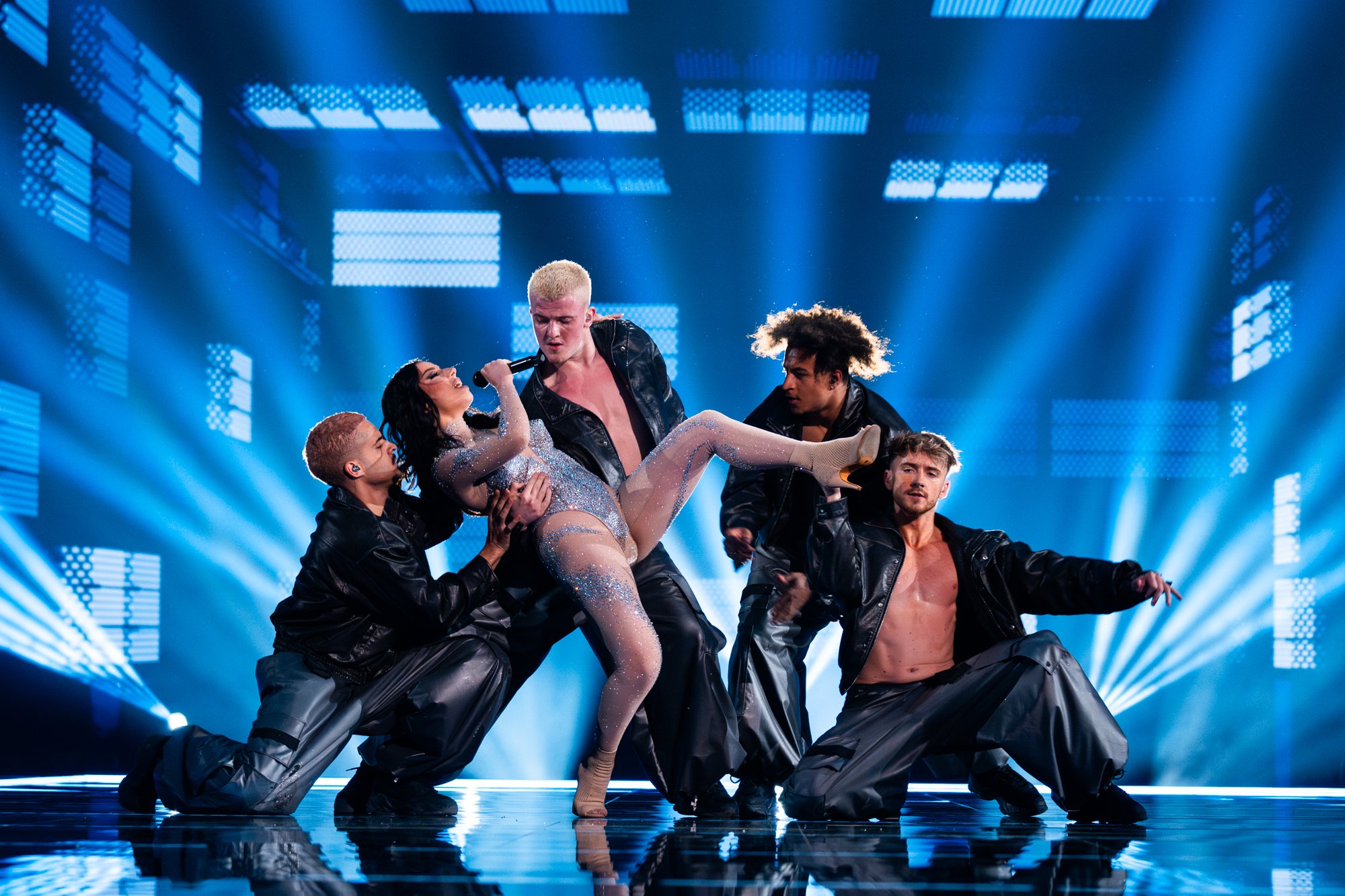
I am what I am, bending backwards trying to fit in
(Corinne Cumming / EBU)
Albania
I have good news and bad news.
The good news: I finally managed to hum the chorus of this on command!
The bad news: It took me 4.5 months.
It’s that type of song and performance I never have anything inherently bad to say about. It’s a pleasant song sung by a good and sympathetic vocalist. It has a competent staging, too.
What it doesn’t have, though, is identity. Visually, there’s not much to remember from it – which would be a problem even if performed last, and is a definite problem when performed in the position where songs go to die. Even as a song it sounds like it’s unsure what it wants to be. Is it an ethnic ballad? A midtempo RnB song? A power ballad? In just a 30-second clip it manages to feature all three, and not even necessarily at the same time. This is so damn competent and professional we don’t even get a random prop or outrageously ridiculous fashion choice to serve as a distraction and back-up strategy.
Greece
This year’s Greek performance is one of the main victims of the common syndrome, fandomis comparitis, in which many fans who got accustomed to seeing a videoclip of a popular entry are let down because it looks nothing like the video or like they imagined it should be (see also: Netta’s Toy in 2018).
We all suddenly become staging experts who know better than Fokas Evangelinos. I mean, sure, I’m still convinced I could have staged “La Venda” better than the convoluted mess that it was, but the man has directed 18 Eurovision performances, 14 of them were in the top 10 and one of them is yet to compete.
Admittedly, I also struggled with symptoms of the syndrome, having been disappointed to discover the staging is considerably less colorful and lacking the touch of the Mediterranean sun and humor the videoclip has. We tend to forget, though, that viewers don’t know what we know, and they watch this for the first time. They won’t know what is missing, but they will see what is actually there, and what it has is several things that can work in its favor.
It’s extremely hard to pull off the continuous long-shot they decided to go for, but it does not only create a dynamic sense of movement which suits this song, it also creates an overall feel that is very distinct from the songs that come before and after. Marina is also an experienced performer whose strength throughout her career was creating personable performances which allow her viewers feel like they are part of the experience. The camerawork here lets viewers join her on stage and she knows how to speak to the camera and back to them. Bonus points: fun choreography and the small bits of Greekness thrown in, making sure we remember exactly who sent this entry.
Switzerland
Where do I start with this one? Probably with the thing that all viewers will notice first: this costume.
Do I hate it? With every fiber of my being. It’s basically every single element that I’d never ever even consider wearing put together. It’s not even an issue I have with Nemo specifically wearing it – I’d see no reason for any performer performing any kind of song wearing this, because it’s just like having something shout at my eyes for three minutes.
But do I think it matters? Not really. While I do think that something else – like, literally anything else – could have looked nicer, I don’t think it matters much in the grand scheme of things as long as the performer looks comfortable wearing it. Since Nemo absolutely seems to enjoy wearing this and, I imagine, had a blast going over dozens of Harley Quinn cosplay ideas with the costume designers for inspiration, this costume remains mostly a “me” problem, not a Nemo problem.
That’s because Nemo has a really good song, a really good voice, a very likable presence and they seem to have the absolutely best time of their lives belting the song while twisting themselves into shapes as they stand on a rotating satellite dish – as one does at Eurovision.
Czechia
In a perfect world, there would be absolutely no difference between men being shirtless and women – not even being shirtless, mind you, just looking like they are. But we do not have a perfect world, we have this one, and in this one I think it’s fairly easy to assume that too many people will spend too much time to figure out what exactly Aiko and her dancers are wearing.
On a personal level, I don’t really mind the faux-nudity. I don’t even mind the somewhat forced connection drawn between self-love and the ownership of our bodies as women. I do mind that it feels less like a feminist statement and more of a ploy to distract from a very basic song. I also mind that this costume design is just not very appealing, but to each their own, I guess.
Funnily enough, I don’t think I heard this song in full more than once, but if there’s one random line my brain will sometimes start singing to itself at 3am when I can’t sleep it’s “Put! Myself! On a Pedestal!” Human brains are weird.
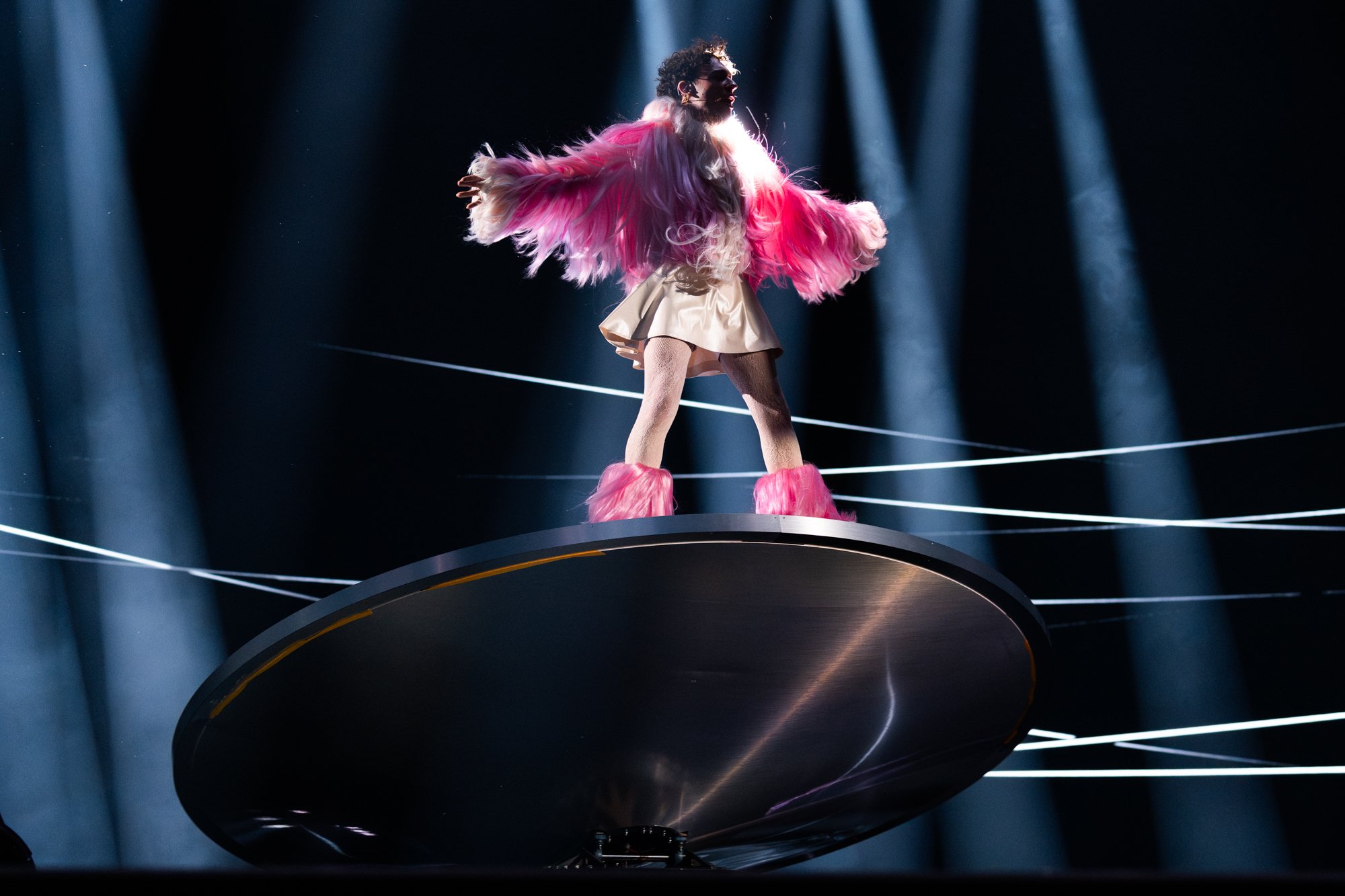
My secret combination is a mystery for you
(Corinne Cumming / EBU)
Austria
If there’s one performance this year that looks exactly like the song sounds, that’s Austria. It sounds like every other Eurodance 90s song from the 90s. It looks like the quintessential Eurodance videoclip, a decade in which you could not even call yourself a Eurodance artist unless you had at least one monochromatic promo video performed in an industrial warehouse with a group of backing dancers wearing either black clothes or silver body paint, sometimes both.
For anyone who was alive in the 90s, this is nostalgic. For anyone who wasn’t, this is fun, because 90s dance was freaking awesome. The vocal requirements are minimal – she just needs to hold it well enough to not clash with the backing track, which she does. I wasn’t sure if she has the stage presence to really sell this, but on stage she’s surprisingly sweet and (unsurprisingly) a strong dancer. That is really all this song needs to qualify… and then probably finish 16th, because while juries can be forgiving of basic vocals in uptempo songs, there are probably limits for how forgiving they can be and I imagine “audible vocals” is a requirement. Go figure.
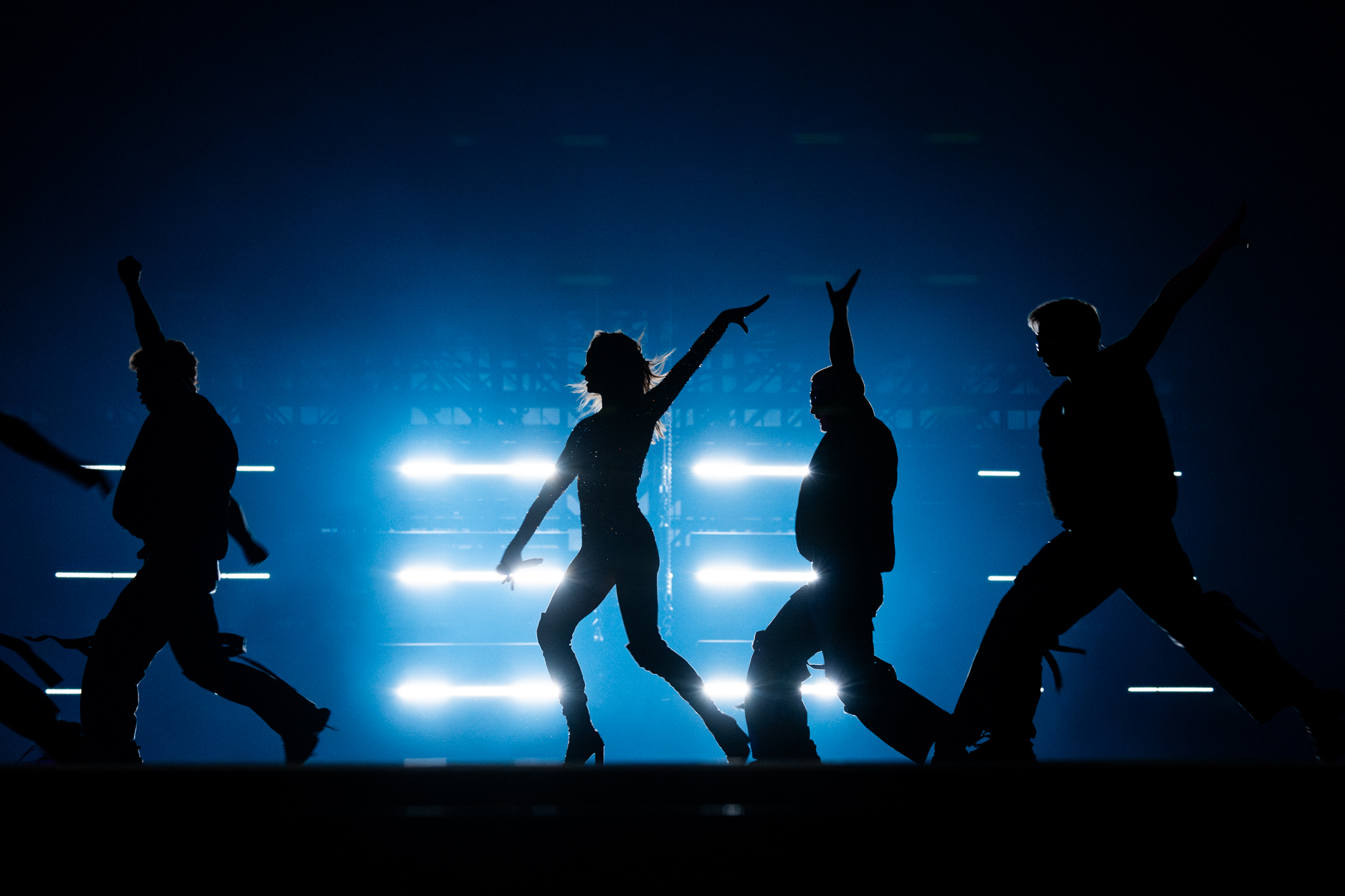
Do you want to see me dance?
(Corinne Cumming / EBU)
Denmark
I can’t decide if being sandwiched between Austria and Armenia, two very loud, upbeat songs is good or bad for Denmark. On one hand, it’s a breather, and Denmark, as always, excels at middle-of-the-road competency. On the other hand, “Sand” is not the most interesting song and it has the misfortune of being in a very difficult semi.
The staging and camerawork are smart and effective, and I don’t know that there’s much more I could have asked from the Danish delegation nor from Saba’s performance, but not unlike Iceland from the first semi-final, its main achievement is being there for three minutes and at least delivering a performance they will not be ashamed to look back at.
Armenia
Let me start from the end: I have absolutely no idea how this one will do. I always find that songs that are heavily folkloric are very hard to call because it’s difficult to judge their appeal across the board. On a personal level, I’m always delighted when countries bring their own flavor to the context regardless of the risk, because I like feeling like I’ve learned something about a country from the song it sent. In this particular case it’s also a style of music I’m familiar with and relate to, so I’m definitely a captive audience.
That aside, what I think works here – especially if they can make it last through three minutes – is joy. Joy in the performance, in the melody, and in the unique sound of the instruments. Joy is infectious, and it can be way more crucial for making people connect to a song than, say, a genre they are unfamiliar with or even not fans of. It’s not quite the same style, but I kept thinking about Zdob și Zdub’s “Trenulețul”, which basically ended 7th because it was just fun. You had fun in the hall, you had fun at home. It’s hard to dislike something when it makes you smile, and that will be the test for Ladaniva: can they make people feel happy for three minutes? That’s what they need to make this work.
Latvia
You know what’s killing me slowly, Dons? Hearing you sing “It’s killing me SLOW” every single time there’s a clip from your song anywhere. Like, I understand, musically, why this is the chosen bit, but seriously. Might as well dig my own grave as well instead of selling out something so hollow just because it fits a melody. Ugh. Yes, yes, I know, David Guetta did it first. David Guetta also sold 50 million albums and has over 14 billion streams. You’re not the same.
But I digress. Great song, great voice, good job on joining Azerbaijan in that literal prop competition with a hollow prop right behind you that as far as I can tell does nothing other than being there. Hollow.
Also, Dons, can we speak about your styling? What are you wearing, exactly? It’s a nice shade of blue, don’t get me wrong, but it seems very rigid and not conducive to basic human functions like breathing. Maybe that is what’s killing you slow?
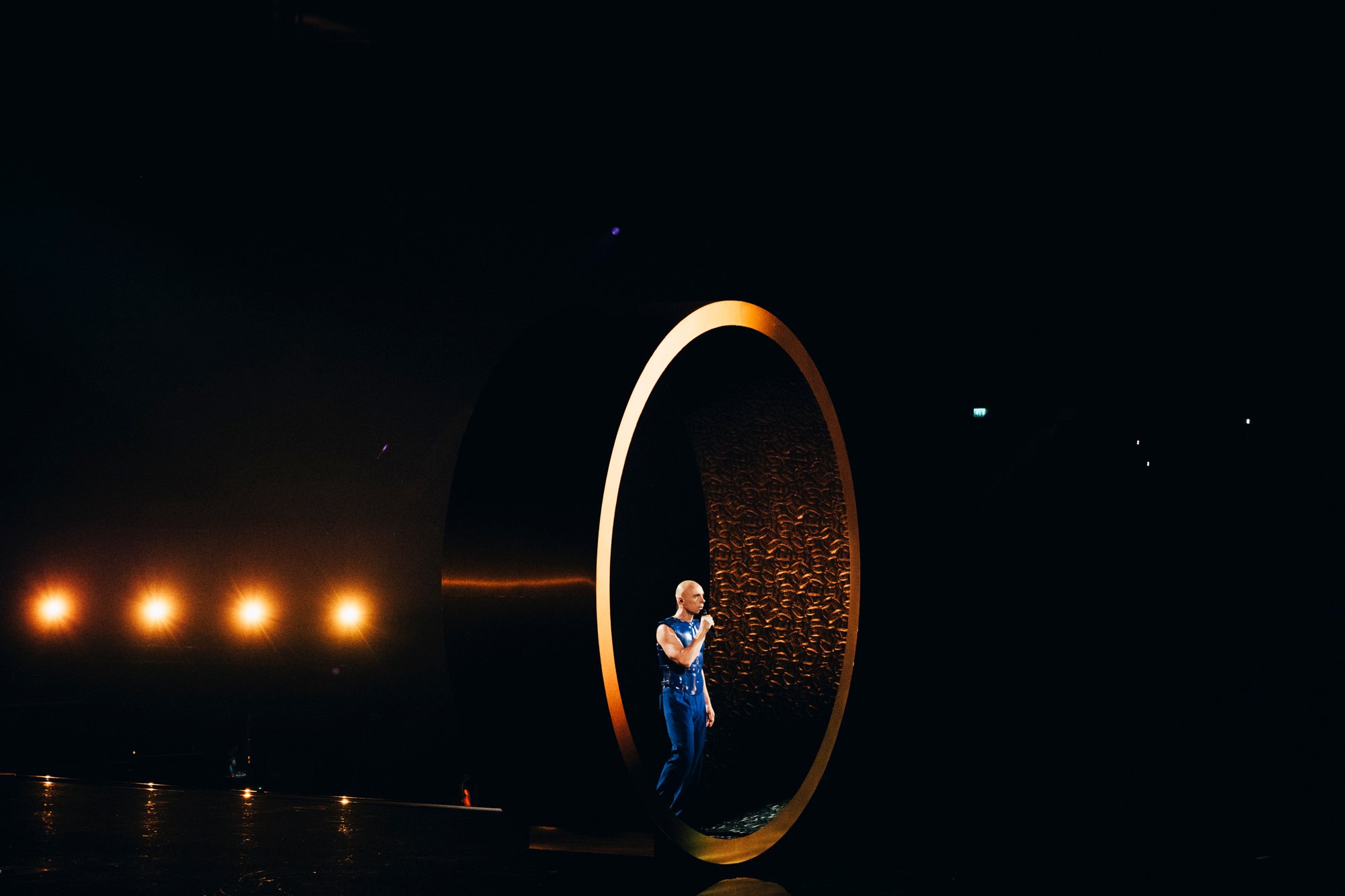
I’m not the same, no
(Sarah Louise Bennett / EBU)
San Marino
I’m writing the semi-final review in order of the competing entries, even though the automatic finalists perform during the night as well, and I find it hilarious that not-Spain is performing right after Spain. Turns out Switzerland is not the only country starting with an S to have a Harley Quinn cosplay obsession, and on top of that, the costume designer of not-Spain clearly made the initial sketches after going to the cinema and watching Oppenheimer and Barbie back-to-back.
Last year, Megara tried to represent actual-Spain with Aracdia, finishing fourth in Benidorm 2023. This year’s competition in the not-Spanish national final wasn’t as strong so they managed to win with a song that is considerably weaker than Arcadia, but I personally still like it quite a bit and it’s nice to have a bit of rock in any style in a year that doesn’t have much of it. Megara comes in with both experience and professionalism that make this non-Spanish entry a much stronger stage presence than the last few entries from this tiny nation.
Georgia
There’s fire. Everywhere! In the backdrop, in the lyrics, in the pyros that are worth the monthly heating budget of a small nation, even the costume that is cleverly made to look like fire.
I haven’t followed the artist selections or preview parties this year, so it wasn’t until I watched these rehearsal videos that I realized that Nutsa is actually really good at this entire performance thing. This performance is what Malta so desperately wants to be and fails to: a fiery and confident execution of an intricate choreography that I can’t wait to see the full three minutes of.
The lyrics, like basically every Georgian entry, don’t actually make sense – because if you’re trying to put out the fire, then this is the one thing you’re currently failing at, Nutsa. But yeah yeah, fire. No one actually cares.
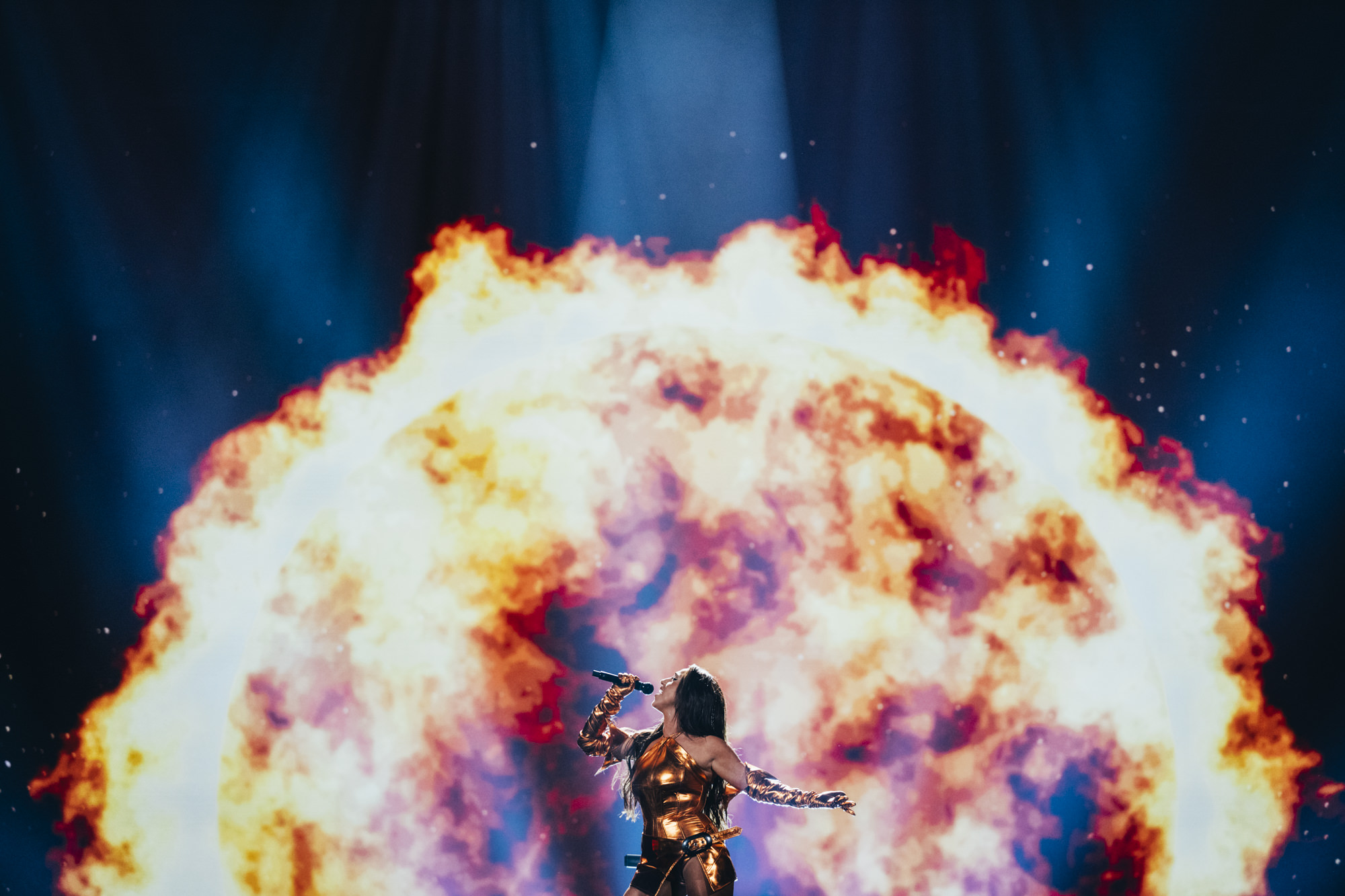
May the slightest light start a fire
(Sarah Louise Bennett / EBU)
Belgium
Someone very evil must have been responsible for this running order, because otherwise it’s hard to explain how we got two fiery songs in a row, with the second one trying very hard to be the one out of the two that no one actually wants to see the full three minutes of.
It’s unfortunate, really, because as a song this is one of my favorite tracks this year, and when I saw Mustii speak I thought he was actually a very sweet guy. On stage, however, he’s not the most captivating performer, and to mitigate it it seems like the staging is focused on not showing him whenever possible. There’s a lot of long and wide shots, and every close up on his face cuts away very quickly. The effect of that is more unnerving than helpful, though. Song-wise, this should be such an easy qualifier, but even though I generally think that bad stagings can only ruin so much for good songs, stagings that don’t allow a connection with the performer can ruin quite a bit.
Estonia
The staging directors watched past Eurovision performances for inspiration and the best they could come up with is the love child of Pollapönk and InCulto? Really?

TL;DR
(Sarah Louise Bennett / EBU)
Israel
In the footage from both the first and second rehearsals, the Israeli delegation made a very conscious choice of showing parts from very early in the song. I imagine that the performance, like the song itself, is a story that develops throughout the three minutes so they didn’t want to reveal anything out of sequence and diminish its emotional impact. The camera work and framing throughout the 30 seconds of published rehearsal are incredibly tight, never showing the audience, with no long shots and barely any wide shots – and when it does the latter, the areas in the sides and back are covered with complete darkness. I can only guess, but I wonder if it will remain that way throughout, never breaking away from the story that taking place on stage by Eden and the dancers as they dance around the eye of the storm.
Personally, I’ve never been a fan of modern dancing in Eurovision. Too often it is just a thing that happens on stage to add a bit of action and movement to a performance but gets lost with the camerawork going away and focusing on the stage, the crowd and of course, the performer. It’s extremely difficult to make it work as a core part of a performance, but this is what they’re aiming for on top of Eden’s excellent vocals. As it stands, I’m not entirely sure what the dancers are actually doing in the clip we have, for example, but I feel it’s the equivalent of overhearing a part of a story, not knowing what came before and after. The story, as they say, is to be continued.
Norway
Much like Ireland in the first semi-final, this is yet another song that feels like it’s more about the concept than a song, but the song itself feels like an idea that was only developed halfway. It turns out that the original song is almost double in length, so maybe my internal math wasn’t off the mark.
Unlike Ireland, though, this is a much more complex work both lyrically and musically, and brings not just the Norwegian language to the stage, but also its traditions of music, storytelling and folklore that, even within a musical style that isn’t for everyone, manages to bring across much depth and authenticity – a word that is probably generally overused when talking about Eurovision, but I do try to keep it for cases when there’s really no better word. I was not familiar with Gåte prior to their participation in this year’s MGP, but I was not at all surprised to find that they’ve been active for over two decades. The experience is evident in every second of this and, combined with the layers of the song itself, it creates a very strong package despite its shortcomings.
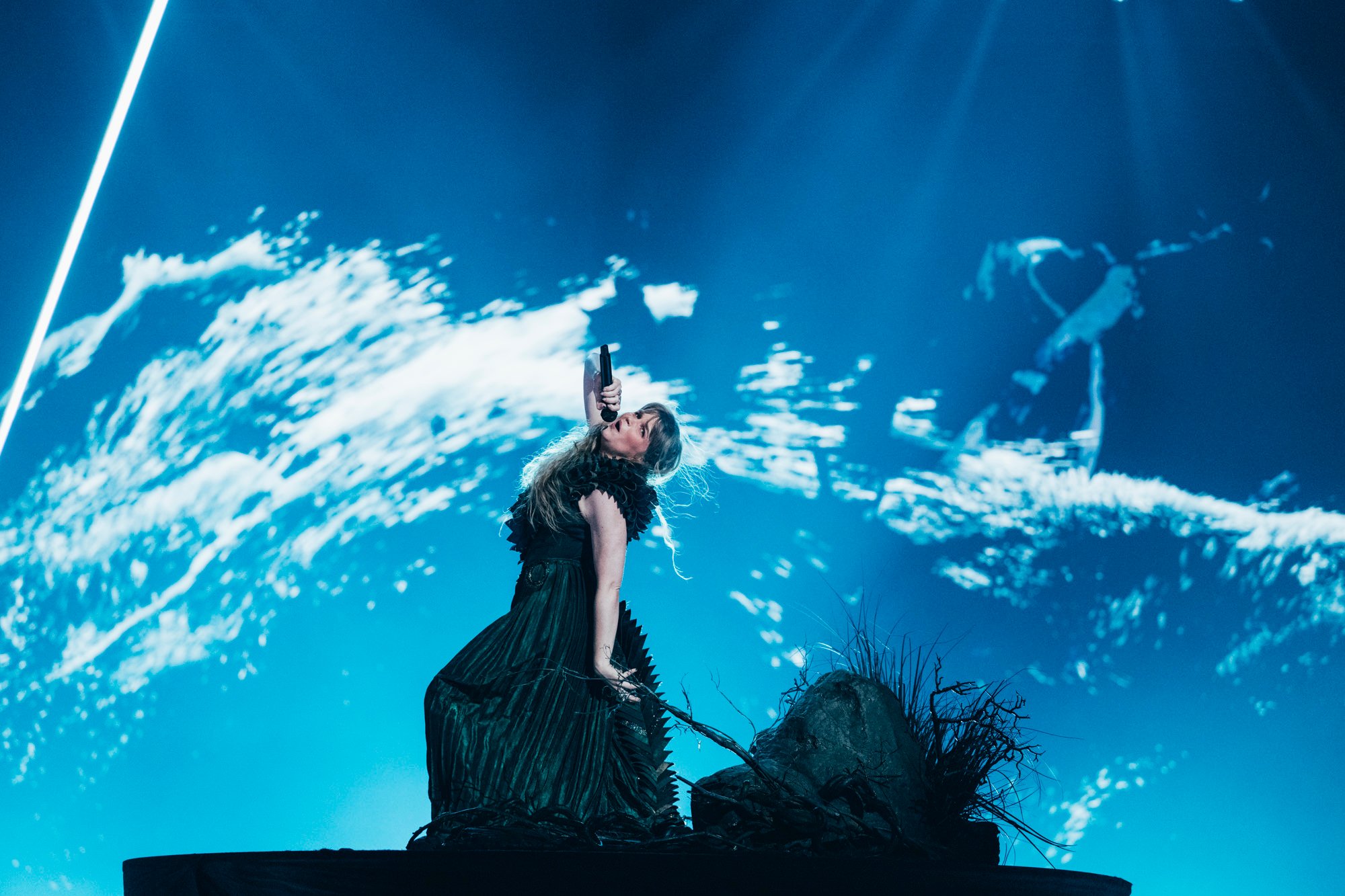
They whine and roar, hungry for more, yellow glowing eyes, I’m hypnotized
(Sarah Louise Bennett / EBU)
Netherlands
Wait, Dustin the Turkey moved to the Netherlands, studied Dutch and formed a 2 Unlimited and Vengaboys tribute band? I’m so confused. I was confused by this even before I saw the staging. I was more confused when I saw the staging and it made me google stuff about birds and European Union symbols. I do appreciate the serious 90s dose, though. We didn’t have enough 90s music in Eurovision during the actual 1990s, but it’s never too late!
Also confusing: lyrics that are sometimes a parody, sometimes emotional and sometimes not even words, and a fashion style that makes it unclear whether Joost is performing as himself or as an invented character. I even checked on Wikipedia and remained confused, although I did learn that Joost actually intended this to sound like a tribute to 2 Unlimited and Vengaboys, so I’m perhaps unintentionally less confused than I thought I was!
I’m still confused, really, but having this as the closing song of the night is the perfect reminder that maybe the real winners of this semi are the friends that we made along the way.
I have to say that after watching the first semi-final, having the direct finalists perform during the night actually worked – but I’m sorry, you’re not competing and so you’re going to be waiting your turn in the direct finalist corner where this blog is concerned.
France
I don’t know if you’re aware, but Slimane can sing. If you’re not aware, the three minutes of Slimane’s performance (who, for full disclosure, is an artist I generally like a lot and very familiar with the music on) will make sure you will know it. Slimane also loves singing, and therefore it might not be as surprising as initially thought to have developed such a close relationship with a microphone. Significant parts of the song are performed with Slimane standing a few steps away from the microphone so he could gaze at his beloved partner in crime and express his love and devotion as he promises to love it and wait for it forever.
Well, probably not, but I don’t really have a better idea of why he is shouting loving words at the microphone from half a stage away. It’s a gesture that on one hand is noticeable and memorable but on the other hand just feels so incredibly overboard it can easily cross over into the ridiculous territory. One thing that I’m not sure how to judge is how he comes across for people who see him for the first time. I know him too well, but I’m afraid that this style of performance can be too intense and even off-putting. Thankfully for him, though, he is already directly in the final where the juries will make sure to reward Slimane and his microphone some love.

Feker libi, habib albi, ahuv libi
(Alma Bengtsson / EBU)
Spain
Speaking of fun retro songs, nostalgia for music from decades past and dodgy vocals, let me introduce you to Spain, who brings a winning combination of an infectious song, unashamedly camp performance and a general attitude of not giving a **** what anyone else thinks. It’s an attitude that goes hand in hand with what the song is about, so maybe it is no surprise that the staging is essentially an upgraded version of what made it a somewhat surprising winner at Benidorm.
Is it the most professional and capable performance of this line up? Not really, but it’s oh so much fun from the very first chords and the opening few seconds of the performance. If you’re the target audience of this, it will get you right from the start. If you’re not, it was never meant to be anyway.
Italy
There’s no bigger contrast this year between lyrics and melody than Italy’s entry. The music feels like yet another fun summer song. The lyrics, however, are the exact opposite, and explore an inner world of pain, misery and total boredom.
The question is, of course, is how do you even stage this, especially knowing that the audience for the most part doesn’t actually get the lyrics. And the answer is, perhaps, exactly what Italy did with this. The choice of the dramatic red and black dead vines creates a very intense and bleak atmosphere but it is balanced out by using the entire space of the stage so the prop doesn’t make it feel too claustrophobic. Angelina also brings an easy air of star quality that helps her carry a complicated song with a relatively minimal staging.
And that’s that! Somewhere in these 37 songs there’s even a winner. But that’s a story for another post…

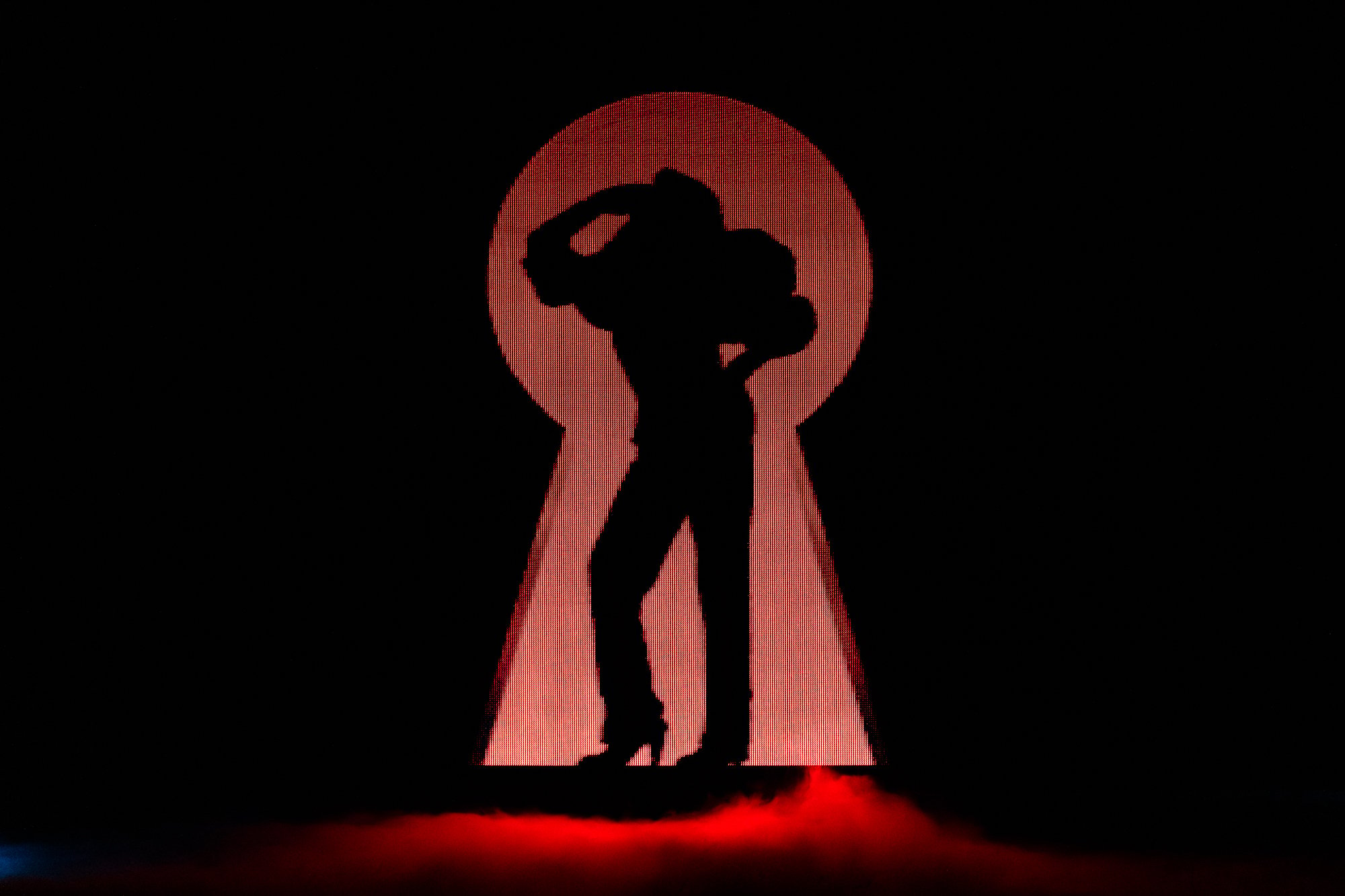




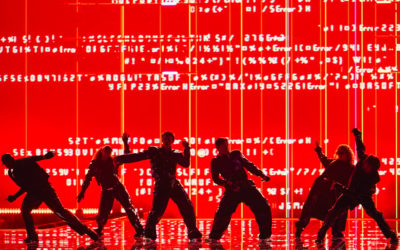






0 Comments